Indication
This formula was originally recorded in the ‘Treatise on Cold-induced Diseases’ (shang han lun), by Zhang Zhong-jing (circa 150 – 219 C.E.). It was originally used for invasion of the Bladder (the Greater Yang Fu organ) by exogenous Cold. The pathogen impairs the Bladder’s Qi transformation function, giving rise to urinary retention, distension with a sense of fullness of the lower abdomen, thirst, irritability etc.
Like so many of the formulas that Zhang recorded, this one is so brilliantly composed that, in efficiently addressing the underlying pathologies, its clinical applications extend well beyond the original indications. The formula is composed of three groups of herbs:
a) Diuretics that expel Damp,
b) Spleen tonics that promote the Spleen’s transformation and transportation functions in order to support the overall Damp dispelling action of the formula and
c) Cinnamon twig
The latter ingredient epitomises Zhang’s genius. On one level, it demonstrates a pretty ‘standard’ sort of approach: release Exterior Wind-Cold. After all, this is a condition that is due to invasion by exogenous Cold, and we need to dispel this pathogen.
But Cinnamon twig does much more than that: it also activates the Yang and warms the Channels. Thus, it also promotes the Kidney Yang and the Spleen Yang. In so doing it assists the original Qi (yuan qi) to rise up through the Triple Jiao and promote fluid transformation, specifically in regards to the Bladder and Spleen.
In terms of the Bladder, it promotes the descending movement of the Qi in the Triple Jiao, in that it promotes the discharge (i.e. downward movement) of the urine. In terms of the Spleen, it promotes the Spleen’s upward sending (or ‘ascending’) function. This is the function that controls all of the ascending movements of Qi throughout the body.
This function is also central to the Spleen’s role in the transformation and transportation of fluids – sending the clear fluids upwards to the Lung. Moreover, it also assists in the ascent of the original Qi (yuan qi) from the Kidney through the Triple Jiao. In this way Cinnamon twig (an Exterior-releasing herb) exerts a profound influence on the ascending and descending Qi movements throughout the Triple Jiao. This foreshadows Li Dong-yuan’s theories and his unique use of Exterior-releasing herbs by some 1,000 years, see comments on Bu Zhong Yi Qi Tang (Ginseng & Astragalus Formula BP005) above.
The clinical uses of this formula can be divided into four main groups:
1. Retained Fluid in the lower Jiao due to dysfunction of the Bladder
2. Diarrhoea due to retained Damp from Spleen Qi deficiency
3. Oedema due to retained Water
4. Oliguria in a Greater Yang Fu organ syndrome (tai yang fu zheng), due to invasion by exogenous Wind-Cold.
Thus it is apparent that this ‘simple’ formula of five ingredients is truly an example the ‘greatness within the smallness’.
The synergistic actions of the herbs are as follows:
Poria cocos (fu ling), Polyporus umbellatus (zhu ling), Alisma rhizome (ze xie): promote diuresis to eliminate Damp.
Atractylodes rhizome (bai zhu), Poria cocos (fu ling): tonify the Spleen Qi to promote the Spleen’s transportation and transformation of fluids.
Cinnamomum twig (gui zhi), Atractylodes rhizome (bai zhu): warm-tonify the Spleen Yang, promote the ascending Qi movement to facilitate retention and upward movement of the clear fluids.
Cinnamomum twig (gui zhi), Poria cocos (fu ling): promote the descending Qi movement of the middle Jiao and lower Jiao to promote discharge of the turbid fluids.
Indications:
Acute gastroenteritis
Acute or chronic nephritis
Meniere’s disease
Ascites
Congestive heart failure
Signs & Symptoms
Oedema or fluid retention
Oliguria
Sensation of bodily heaviness
Poor appetite
Fatigue
Pallor
Loose stools or diarrhoea
Tongue has a white and slippery coat
Pulse is slippery and floating or weak and floating or weak, slow and deep and may also be rapid
Combinations –
Congestive heart failure:
SHI QUAN DA BU WAN
Gout:
HUO LUO XIAO LING DAN
TAO HONG SI WU WAN
Headache after epileptic fit:
XUE FU ZHU YU TANG
Obesity, dyslipidemia, hypercholesterolemia:
YIN CHEN HAO WAN (Jia Wei)
Oedema, fluid retention:
FU GUI BA WEI WAN
TAO HONG SI WU WAN
TCM Syndromes: Retained Fluid or retained Water (due to Spleen deficiency).
TCM Actions: Strengthens the Spleen and drains Damp, promotes Qi transformation and diuresis.
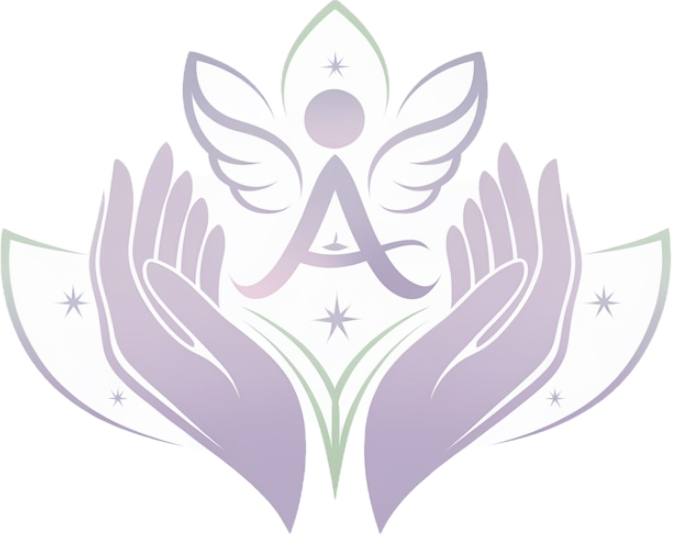
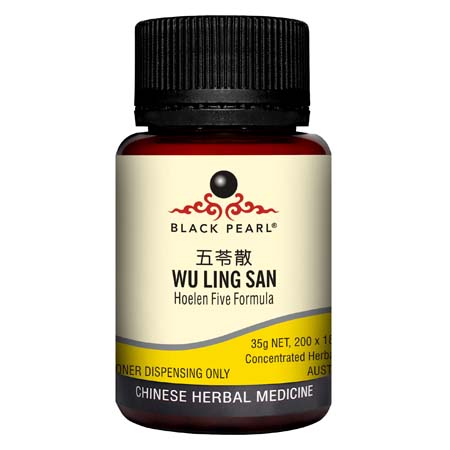
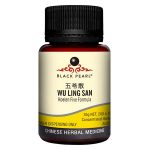

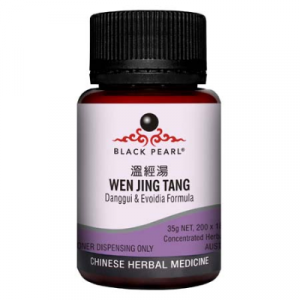
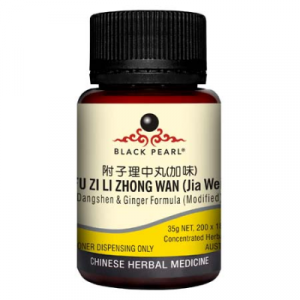
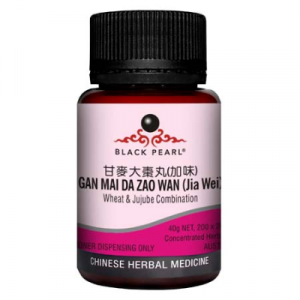
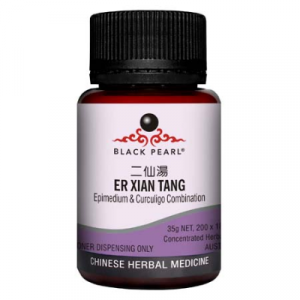

Reviews
There are no reviews yet.